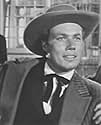In 1955, the golden age of live drama was quickly giving way to filmed series, mostly escapist fare, with the western dominating. Here was one of the few - and at best modestly successful - attempts to bridge the gap. Worthington Miner was a highly regarded producer who was known for the seriousness of his programs. It wasn't likely that he would do an ordinary western. And he didn't. Frontier was the second important anthology western series, with a continuing host ("The Old Ranger" on Death Valley Days) and a promise that each individual episode was at least inspired by something factual. Death Valley Days ran, of course, for more than a decade, with numerous other hosts taking over including, for a well-remembered two-year stint, Ronald Reagan. Frontier lasted only one season, and pretty much served as a foil to Death Valley Days, the latter stressing patriotic themes and upbeat endings. Not Frontier. Each week, the show opened and closed with a caravan of covered wagons heading off into the distance (Death Valley did, in fact, similarly begin with a single Boraxo wagon trudging along). Walter Coy (best remembered as John Wayne's doomed brother in the early sequences of The Searchers) would begin with, "This is the way it happened . . . movin' west" and then close with "That's the way it happened . . . movin' west." The shows were consistently downbeat. For instance: When they did the story of the Alamo, the focus was on the one deserter, not the heroes who died fighting. That episode was called "The Texians," and focused on the impact that the deserter has on a family when he stops at their isolated farm. In real life, the deserter's name was Rose, the family Zuber. No flag waving allowed on this series. Walter Coy not only narrated but showed up once in a while as star of individual episodes.

































